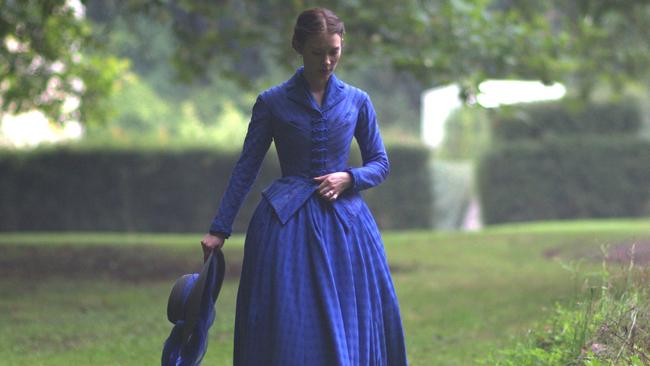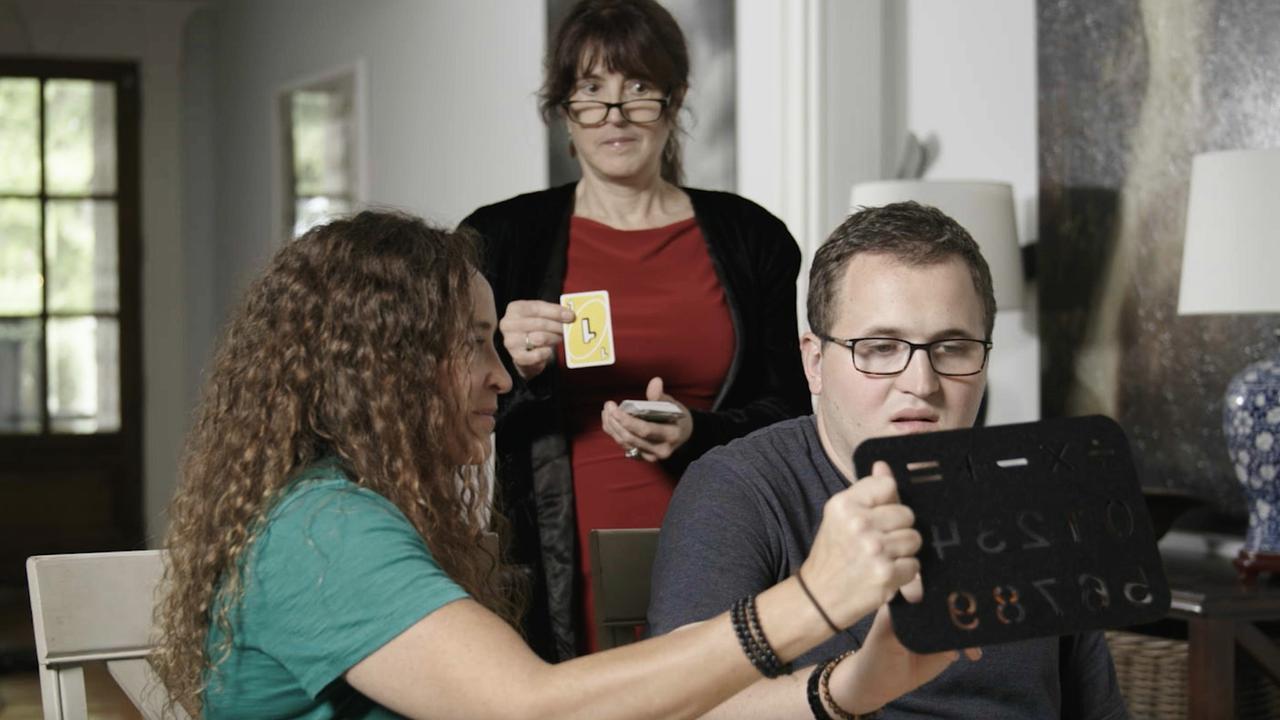David Stratton reviews Madame Bovary, Amy
American accent mars an otherwise outstanding performance by Australian actress Mia Wasikowska in Madame Bovary.

In the footsteps of Jennifer Jones and Isabelle Huppert, Mia Wasikowska embodies the demanding and difficult role of Madame Bovary in the umpteenth film version of Gustave Flaubert’s 1857 novel about one of literature’s most celebrated unfaithful wives.
Since her first appearance in a feature film (a key supporting role in the under-appreciated Suburban Mayhem in 2006) Canberra-born Wasikowska has created a series of unusual and sometimes challenging characters in Australian, British and American films. Never seeking sympathy for the sometimes abrasive characters she plays, Wasikowska has excelled in everything she has done so far, including her portrayal of another great figure of literature, Jane Eyre, in 2011 (and, of course, Alice in Alice in Wonderland).
Emma Bovary provides one of her most challenging roles because Flaubert’s novel features a convent-reared heroine whose treatment of the pleasant country doctor she marries was seen by many as being shameless. In her pursuit of freedom and independence, Emma is in many ways a very modern character, and Wasikowska’s dynamic portrayal, while it still raises moral questions, is one of the best interpretations of the role — and that’s saying something, given some of the previous screen versions of the novel have been made by celebrated directors such as Jean Renoir (1934), Vincente Minnelli (1949) and Claude Chabrol (1991). It’s too early to say if French director Sophie Barthes belongs to that distinguished company; this is only her second feature film, and though ambitious, and in many ways successful, she makes a few missteps along the way.
Chief of these is the question of accent. Goodness knows why Wasikowska was encouraged to speak with an American accent, since she is perfectly capable of speaking in neutral tones; her accent undermines her performance and is particularly grating given Olivier Gourmet, who plays her father in brief scenes, has a Franco-Belgian accent and Henry Lloyd-Hughes, who plays her husband Charles, has a very British one. But, then, the accents are all over the place, with the actors apparently not encouraged to attempt any kind of cohesion. (This may be explained by the fact the film is a British-French-Belgian-German-Australian co-production, but whatever the reason, it is distracting.)
Barthes, who scripted the adaptation in collaboration with Felipe Marino, sticks pretty closely to the novel — or as close as it’s possible to be with a film running a little under two hours. As with the recent Far from the Madding Crowd, a lot of good stuff is left out. The film actually begins as Emma, a bottle of poison in her hand, staggers dramatically through a forest, so from the start those not familiar with the book will be aware the protagonist has a bitter fate in store for her. Flashbacks explore her strict convent education and her precipitous marriage to Charles Bovary, a country doctor who takes her to his home in the small village of Yonville. Very quickly this spirited and independently minded young woman becomes bored with her life, and with the fact her thoroughly decent husband is content with his lot and has no ambition to move to Paris or even to Rouen.
Emma’s relationships with Leon (Ezra Miller), an eager young law student, and with the dissolute Marquis d’Andervilliers (Logan Marshall-Green) eventually offer her alternatives. And there are other diverting men around, including the merchant, M. Lheureux (Rhys Ifans), who encourages her to buy things she doesn’t need and her husband can’t afford, and the local pharmacist, Homais (Paul Giamatti).
The lush photography by Andrij Parekh makes the French landscape look beautiful, but not so much so that Emma’s determination to leave this pastoral idyll and live in a city doesn’t resonate. Despite the film’s shortcomings, Wasikowska’s interpretation of the character seems an entirely valid and modern one and Emma’s story as dark and tragic as ever it was.
****
Amy Winehouse was another woman who died tragically young, and no doubt one day a film or telemovie will dramatise her life. But until then, Asif Kapadia’s fine documentary will have to suffice, and it’s difficult to imagine a fictionalised version that will have more impact than Amy. Kapadia previously made the documentary Senna, and once again he succeeds in making the story of a public personality, whose life might have been thought to be of interest to a relatively restricted niche audience, universal and deeply poignant.
He achieves this thanks to exceptional access to found footage, mostly roughly filmed home videos, with which he fills the screen. These date back to about 1998 when 14-year-old Amy is filmed singing, in that very distinctive voice, Happy Birthday to her best friend Lauren Gilbert. Amy was from a family of London Jews, and she never lost her accent or her ties to her background. Soon after this, talent scout Nick Shymansky encouraged the young composer, who lacked self-confidence to a large degree, to transform her poems into songs. By 2003 she has recorded her jazzy debut album, Frank, and is on the way to a brief but quite glorious career that culminated in singing a duet with her hero, Tony Bennett, who, after her death in 2011 aged 27, compared her singing favourably to jazz greats Ella Fitzgerald and Billie Holiday.
The vast amount of original material edited by Kapadia and Chris King to provide this two hour-plus portrait is intimate and revealing, and Kapadia is clearly so thrilled by the footage at his disposal that he made the decision not to show on screen the various interviewees, including Bennett, who talk about Winehouse but to use them as voices accompanying the visual footage.
Based on the material here it becomes clear Amy’s downfall was accelerated not only by the drugs she took from an early age but by two of the men in her life, specifically her father, Mitch, and her lover and eventually husband Blake Fielder-Civil. The former is seen insisting she make public appearances she’s manifestly not capable of doing (there’s a painful scene on a stage in Belgrade where the audience becomes infuriated because she can’t, or won’t, perform), while the latter admitted to The News of the World in 2008 that he introduced Amy to hard drugs.
But the other men who surely share the blame for Amy’s fate are the British paparazzi who ruthlessly, cruelly pursued the sick woman like a pack of ravening wolves. Just as Princess Diana was driven to her death pursued by these reckless, ruthless members of the press, so Amy, during the period when she was obviously seriously unwell, is unable to escape them as they jostle her and confront her whenever she makes a fleeting public appearance.
Kapadia uses the voices of Amy’s friends, lovers and colleagues to describe what she was really like; record company bosses, executives — even her bodyguards — have their say. But in the end it’s sad Amy: Amy with that memorable singing voice, prickly, unwise Amy whose presence haunts this sad, fine film .
Madame Bovary (M) 3.5 stars
National release from Thursday
Amy (MA15+) 4 stars
National release



